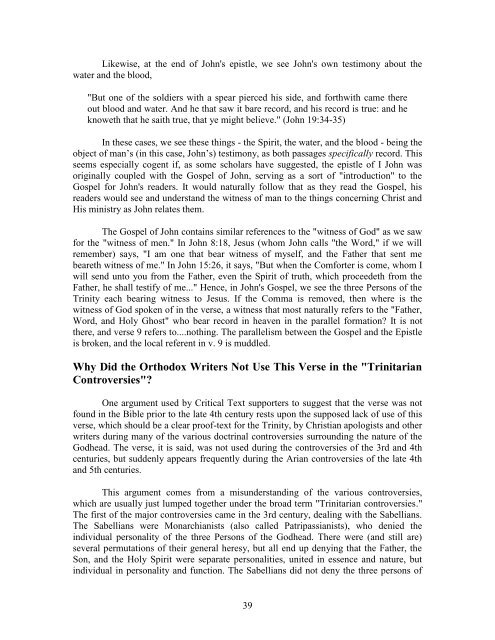A Defense of the Johannine Comma - Study to Answer.Net
A Defense of the Johannine Comma - Study to Answer.Net
A Defense of the Johannine Comma - Study to Answer.Net
You also want an ePaper? Increase the reach of your titles
YUMPU automatically turns print PDFs into web optimized ePapers that Google loves.
Likewise, at <strong>the</strong> end <strong>of</strong> John's epistle, we see John's own testimony about <strong>the</strong><br />
water and <strong>the</strong> blood,<br />
"But one <strong>of</strong> <strong>the</strong> soldiers with a spear pierced his side, and forthwith came <strong>the</strong>re<br />
out blood and water. And he that saw it bare record, and his record is true: and he<br />
knoweth that he saith true, that ye might believe." (John 19:34-35)<br />
In <strong>the</strong>se cases, we see <strong>the</strong>se things - <strong>the</strong> Spirit, <strong>the</strong> water, and <strong>the</strong> blood - being <strong>the</strong><br />
object <strong>of</strong> man’s (in this case, John’s) testimony, as both passages specifically record. This<br />
seems especially cogent if, as some scholars have suggested, <strong>the</strong> epistle <strong>of</strong> I John was<br />
originally coupled with <strong>the</strong> Gospel <strong>of</strong> John, serving as a sort <strong>of</strong> "introduction" <strong>to</strong> <strong>the</strong><br />
Gospel for John's readers. It would naturally follow that as <strong>the</strong>y read <strong>the</strong> Gospel, his<br />
readers would see and understand <strong>the</strong> witness <strong>of</strong> man <strong>to</strong> <strong>the</strong> things concerning Christ and<br />
His ministry as John relates <strong>the</strong>m.<br />
The Gospel <strong>of</strong> John contains similar references <strong>to</strong> <strong>the</strong> "witness <strong>of</strong> God" as we saw<br />
for <strong>the</strong> "witness <strong>of</strong> men." In John 8:18, Jesus (whom John calls "<strong>the</strong> Word," if we will<br />
remember) says, "I am one that bear witness <strong>of</strong> myself, and <strong>the</strong> Fa<strong>the</strong>r that sent me<br />
beareth witness <strong>of</strong> me." In John 15:26, it says, "But when <strong>the</strong> Comforter is come, whom I<br />
will send un<strong>to</strong> you from <strong>the</strong> Fa<strong>the</strong>r, even <strong>the</strong> Spirit <strong>of</strong> truth, which proceedeth from <strong>the</strong><br />
Fa<strong>the</strong>r, he shall testify <strong>of</strong> me..." Hence, in John's Gospel, we see <strong>the</strong> three Persons <strong>of</strong> <strong>the</strong><br />
Trinity each bearing witness <strong>to</strong> Jesus. If <strong>the</strong> <strong>Comma</strong> is removed, <strong>the</strong>n where is <strong>the</strong><br />
witness <strong>of</strong> God spoken <strong>of</strong> in <strong>the</strong> verse, a witness that most naturally refers <strong>to</strong> <strong>the</strong> "Fa<strong>the</strong>r,<br />
Word, and Holy Ghost" who bear record in heaven in <strong>the</strong> parallel formation? It is not<br />
<strong>the</strong>re, and verse 9 refers <strong>to</strong>....nothing. The parallelism between <strong>the</strong> Gospel and <strong>the</strong> Epistle<br />
is broken, and <strong>the</strong> local referent in v. 9 is muddled.<br />
Why Did <strong>the</strong> Orthodox Writers Not Use This Verse in <strong>the</strong> "Trinitarian<br />
Controversies"?<br />
One argument used by Critical Text supporters <strong>to</strong> suggest that <strong>the</strong> verse was not<br />
found in <strong>the</strong> Bible prior <strong>to</strong> <strong>the</strong> late 4th century rests upon <strong>the</strong> supposed lack <strong>of</strong> use <strong>of</strong> this<br />
verse, which should be a clear pro<strong>of</strong>-text for <strong>the</strong> Trinity, by Christian apologists and o<strong>the</strong>r<br />
writers during many <strong>of</strong> <strong>the</strong> various doctrinal controversies surrounding <strong>the</strong> nature <strong>of</strong> <strong>the</strong><br />
Godhead. The verse, it is said, was not used during <strong>the</strong> controversies <strong>of</strong> <strong>the</strong> 3rd and 4th<br />
centuries, but suddenly appears frequently during <strong>the</strong> Arian controversies <strong>of</strong> <strong>the</strong> late 4th<br />
and 5th centuries.<br />
This argument comes from a misunderstanding <strong>of</strong> <strong>the</strong> various controversies,<br />
which are usually just lumped <strong>to</strong>ge<strong>the</strong>r under <strong>the</strong> broad term "Trinitarian controversies."<br />
The first <strong>of</strong> <strong>the</strong> major controversies came in <strong>the</strong> 3rd century, dealing with <strong>the</strong> Sabellians.<br />
The Sabellians were Monarchianists (also called Patripassianists), who denied <strong>the</strong><br />
individual personality <strong>of</strong> <strong>the</strong> three Persons <strong>of</strong> <strong>the</strong> Godhead. There were (and still are)<br />
several permutations <strong>of</strong> <strong>the</strong>ir general heresy, but all end up denying that <strong>the</strong> Fa<strong>the</strong>r, <strong>the</strong><br />
Son, and <strong>the</strong> Holy Spirit were separate personalities, united in essence and nature, but<br />
individual in personality and function. The Sabellians did not deny <strong>the</strong> three persons <strong>of</strong><br />
39


